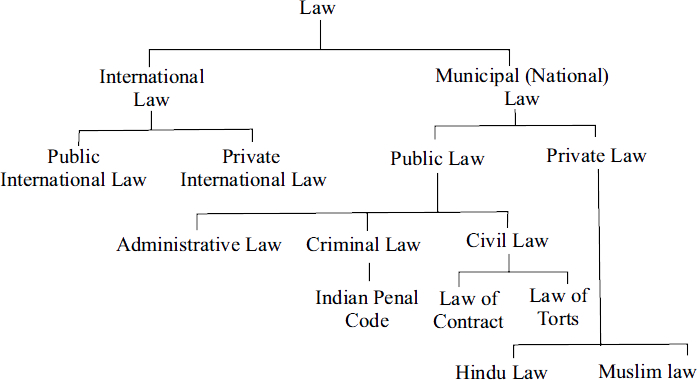Free Full Course Available on LawMint's YouTube Channel
How to Land Your Dream LLB Internship in a Top Law Firm
- Part 1 - Introduction
- Part 2 - Internship Planning
- Part 3 - Internship Research
- Part 4 - Building Your Profile
- Part 5 - The Email
- Part 6 - The Resume
- Part 7 - The Cover Letter
- Part 8 - The Interview
- Part 9 - Self Development
Practical and comprehensive course, with real examples and step-by-step analysis of the complete internship application process. Check out LawMint's YouTube channel now!
For a proper and logical understanding of Law, its classification becomes necessary. It helps in understanding the principles and logical structure of the legal order.
It makes clear the inter-relation of rules and their effect on each other and it also helps in arranging the rules in a concise and systematic way.
The broad classification of law may be as follows:

Primarily, ‘Law’ may broadly be divided into two classes:
1. International Law
International Law is a branch of law which consists of rules which regulate relations between States or Nations inter se.
In other words, International Law is a body of customary and conventional rules which are considered to be legally binding by civilized Nations in their intercourse with each other.
The Oxford Dictionary defines International law as “A body of rules established by custom or treaty and recognized by nations as binding in their relations with one another.”
International Law is mainly based on treaties between civilized Nations. International law may be divided as follows:
(a) Public International Law
It is that body of rules which governs the conduct and relations of State with other States. For example, the extradition treaty between two states to bring back fugitives.
(b) Private International Law
It means those rules and principles according to which the cases having foreign elements are decided. For example, if a contract is entered into in India between an Indian and a British citizen, which is to be performed in Nepal, then the rules and regulations on which the rights and liabilities of the parties would be determined is known as ‘Private International Law’
2. Municipal Law or National Law
Municipal Law is that branch of Law, which is applied within a State. It can be divided into two classes.
(a) Public Law
It regulates the organization and functioning of the State and determines the relations of the State with its subjects. It may be further divided into three classes:
i. Constitutional Law
Constitutional Law is the basic or fundamental law of the State. It is a law which determines the nature of State and the structure of the Government. It is superior to the ordinary law of the land because ordinary law derives its authority and force from the Constitutional Law.
ii. Administrative Law
This law deals with the structure, powers and functions of the organs of administration; the limits of their power; the methods and procedure followed by them in exercise of their power; the methods by which their powers are controlled, including remedies available to a person against them when his/her rights are infringed by their operation.
iii. Criminal Law
It defines offences and prescribes punishment for them. Its aim is the prevention of and punishment for offences because in civilized societies, ‘crime’ is considered to be a wrong not against the individual but against the society.
(b) Private Law
This branch of law regulates and governs the relations of citizens with each other. It includes Personal Law e.g., Hindu Law and Muslim Law.
Apart from these kinds of law, there are some other varieties of law as follows :
Natural or Moral Law
Natural Law is based upon the principle of right and wrong. It embodies the principles of Natural Justice.
Conventional Law
Conventional Law means any rule or system of rules agreed upon by persons for regulation of their conduct towards each other. For example, Indian Contract Act, 1872 deals with the rules on making agreements.
Customary Law
Any rule of action which is actually observed by men/women when a Custom is firmly established, is enforced by the State as law because of its general approval by the people.
Civil Law
The Law enforced by the State is called Civil Law. The force of State is the sanction behind this Law. Civil Law is essentially territorial in nature as it applies within the territory of the State concerned.
Substantive Law
Substantive Law deals with rights and obligations of the individuals against the State and prescribes the offences and punishments for the commission of such offences. For example, India Penal Code, 1860 contains Sections on various offences and corresponding punishments for those offences.
Procedural Law
It deals with the practice and procedure having its objective to facilitate the administration of justice. It is a process necessary to be undertaken for enforcement of the legal rights and liabilities of the litigating parties by a Court of Law. For example, the Criminal Procedure Code, 1973 enshrines the procedures to be followed to inflict punishment on the wrongdoer.
Questions
Make out a distinction between Public and Private Law?
‘Public Law’ regulates the organization and functioning of the State and determines the relationship of the State with its subjects whereas Private Law regulates and governs the relationship of citizens with each other.
Distinguish between Substantive and Procedural Law?
‘Substantive Law’ deals with rights and obligations of the individuals whereas Procedural Law deals with practice and procedure having its objective to facilitate the administration of justice.
Describe the main objective of Criminal Law?
The main objective of ‘Criminal Law’ is to prevent crime and to punish the wrongdoer.
Article summary : Broadly, ‘Law’ may be classified into International Law and Municipal (National) Law which can be further divided into Public and Private Law and then Substantive and Procedural law.
Free Full Course Available on LawMint's YouTube Channel
How to Land Your Dream LLB Internship in a Top Law Firm
- Part 1 - Introduction
- Part 2 - Internship Planning
- Part 3 - Internship Research
- Part 4 - Building Your Profile
- Part 5 - The Email
- Part 6 - The Resume
- Part 7 - The Cover Letter
- Part 8 - The Interview
- Part 9 - Self Development
Practical and comprehensive course, with real examples and step-by-step analysis of the complete internship application process. Check out LawMint's YouTube channel now!
Acknowledgement – This article is adapted from Swayam – NIOS course material.












